Program
The International Institute of Fisheries Economics & Trade (IIFET) Conference serves as a valuable platform for its members and other participants to stay abreast of important research developments in seafood trade, aquaculture and fisheries management. This biennial event attracts natural resource and environmental economists, interdisciplinary fisheries and aquaculture researchers, managers, government, NGO and international agency staff and industry representatives from around the world, representing diverse fishing regions. Through keynote presentations and submitted papers, a wide range of applied and theoretical topics related to the field are explored. These conferences offer unparalleled opportunities for attendees to engage with leading fisheries economists and those seeking economic expertise, fostering both formal and informal interactions and opportunities to network. Moreover, the conference's international rotation allows delegates to explore various locations worldwide, gaining valuable insights into fishing and aquaculture activities around the globe.
Conference Theme
Food systems sustainability, the rise of the ‘blue economy’, a global reckoning with rising economic and social inequalities, climate crisis and the impacts of COVID-19 are major issues that intersect and bear on fisheries and aquaculture economics and trade. It is just six years before humanity is due to meet a set of ambitious UN Sustainable Development Goals, to which the aquatic food sector makes important contributions. To focus the attention of IIFET on this nexus and on progress towards sustainability, as a contribution to SDG14 ‘Life Under Water’, the 21st biennial IIFET conference theme will be Aquatic Food Systems in the Blue Economy.
Novel Thematic Sessions
In addition to sessions proposed by IIFET members and sessions that reflect key research arenas of IIFET members (e.g. productivity, technological efficiency, governance, gender analysis, policy analysis, trade and market dynamics), there will be four novel sub-themes to give the conference a unique intellectual identity:
Policy Forum
The Policy Forum at the start of the conference, on July 16 will focus on the emergent concept of nutrition-sensitive aquatic food systems and will be headlined by the originator of the concept – Dr. Shakuntala Thilsted, 2021 World Food Prize Laureate. There will also be contributions from government representatives, including a keynote from the Director of Fisheries for Malaysia, Dato’ Adnan bin Hussain, as well as international agency and private sector actors.
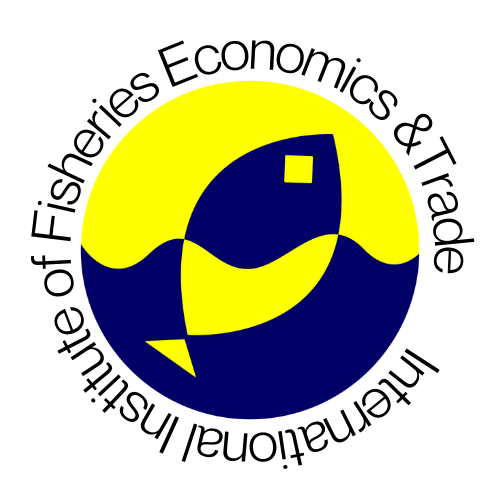
The Economics of Food and Nutrition Security
With rising interest in and need for ’nutrition-sensitive’ fisheries and aquaculture, and proposals for managing multispecies fisheries for maximum nutrient yield, comes the need for economic analyses of trade-offs, benefits, price-nutrient richness relationship and how they evolve, and ways to incentivize the sector to supply nutrient-rich foods to the nutritionally-vulnerable income-poor people who need them most and to tackle widespread malnutrition in low- and middle-income countries. Topics may include:
- Fisheries economics and public health policy: The economics of nourishing nations
- The first 1000 days: Addressing maternal and early years nutrition needs with aquatic foods
- Food waste and loss: Economic perspectives on problems and solutions
- The effects of international trade on availability of aquatic foods to populations that need them most for nutrition
Ocean and Inland Water – Distributional Justice
Food production takes place in spaces experiencing the ‘blue acceleration’ – the rapid industrialization of the oceans. How can human health, as a public good, and other economic and societal contributions from fisheries and aquaculture be maintained? Topics may include:
- Making space for aquatic food systems in contested coastal and inland waters
- Gender transformative approaches in aquatic food system governance: Economic analysis
- Maritime crime, IUU and inequality at sea
- What about traditions and culture? A role for economic analysis in pluralistic value systems
Governing for Resilience in Aquatic Food Systems
Most economic analyses optimize for simple utility functions – e.g. yield, income, profit and employment. With talk of resilience-based management comes the possibility of optimizing for resilience – which will first need defining – with an emphasis on resilience to shocks (such as COVID-19) and global change (e.g. climate). Topics may include:
- Conceptual and methodological development of economic tools for resilience assessment
- Shared prosperity from fisheries and aquaculture in a changing climate
- Gendered understanding of economic resilience
- Resilient livelihoods: Diversification/Specialization debates
- Lessons for equity and resilience from the impacts of COVID-19 on aquatic food supply chains
Fisheries, Aquaculture and Trade Futures
The seafood/aquatic foods sector is growing and is increasingly an arena for societal debate on which ‘planetary diets’ are most sustainable, healthy and affordable. The outcome of these debates are likely to influence the development trajectories for capture fisheries, aquaculture, mariculture and of plant-based and lab-based ‘seafood’. Forecasting, foresight and scenario analyses can all usefully be brought to bear on guiding policy formulation in this dynamic context with high irreducible uncertainty. Topics may include:
- Aquatic food futures: Economic forecasts, foresight and scenarios
- Gendered analyses of evolving demand for aquatic foods
- Economics of aquatic food frontiers: Seaweed, seagrass rice, lab-grown fish, multi-trophic aquaculture, offshore aquaculture and land-based systems
- Diversity, dynamism and the future of small-scale fisheries and aquaculture
- Projected benefits from genetic improvements in aquaculture
- Do certification schemes have a future in the tropics?
- Digital technologies, traceability and fisheries and aquaculture supply-chain governance
Policy Forum
The Policy Forum at the start of the conference, on July 16 will focus on the emergent concept of nutrition-sensitive aquatic food systems and will be headlined by the originator of the concept – Dr. Shakuntala Thilsted, 2021 World Food Prize Laureate. There will also be contributions from government representatives, including a keynote from the Director of Fisheries for Malaysia, Dato’ Adnan bin Hussain, as well as international agency and private sector actors
Pre-Conference
Workshops
As part of the conference, a number of workshops and advanced training courses will be available for delegates to sign up to. These workshops will be held on Monday, 15 July 2024, at WorldFish headquarters at Batu Maung, Penang. Workshop cost, topics, and their descriptions are as below.
Cost:
$100 for the full-day Gender workshop
$100 for two half-day workshops (morning and afternoon)
$75 for one half-day workshop (morning or afternoon)
Participants wishing to only take a half-day workshop – morning or afternoon - are also invited to have lunch with all short course participants at WorldFish
Integrating Gender into Fisheries and Aquaculture Economics and Trade Research
This full-day workshop will be of interest to economists and interdisciplinary fisheries and aquaculture policy analysts, managers, researchers, and project planners wishing to deepen their understanding of the way gender structures economies and resource systems management and influences economic research and policy.
Women make crucial economic and social contributions to fisheries and aquaculture yet are overlooked in economic analysis, sectoral policymaking, and governance. The gendered impacts of technological innovation, economic change, and ecological shock are still poorly recognised. Even when women are included in research and data, they are often treated as a homogenous group, thereby overlooking opportunities for improving women’s status and contributions in the sectors and critical forms of compounding marginalization, such as extreme poverty, ability, or ethnicity.
The objective of this workshop is to enhance capacity for the integration of theoretically informed gender analysis in economics and trade research within fisheries and aquaculture. Through the workshop, participants will gain an understanding of why a gender perspective is important for achieving a deeper and more robust analysis of critical economic questions such as who does what in fisheries and aquaculture economies, how divisions of labor shape welfare, and the impact of economic transformation and development. Participants will also gain skills in analyzing gender in social structures in which fisheries and aquaculture economies are embedded as well as knowledge about what elements need to be considered to develop rigorous research on gender in fisheries and aquaculture economics.
Facilitators
Holly Hapke, University of California-Irvine
Carmen Pedroza, Universidad Nacional Autónoma de México
Cynthia McDougall, Stockholm Environment Institute
Kyoko Kusakabe, Asian Institute of Technology
Tara Nair, Work Fair and Free Foundation, Bangalore
Meryl Williams, Asian Fisheries Society, Gender in Aquaculture and Fisheries Section
Introduction to the Fisheries Performance Assessment Toolkit (FPAT)
This half-day workshop will introduce users to the FPAT toolkit and examine some case studies carried out through the FAO’s Coastal Fishery Initiative. Attendees will learn about the FPAT process, data and personnel needs, and the benefits of its application in fishery investment projects, as well as research collaboration.
The Fisheries Performance Assessment Toolkit (FPAT) is a pair of technical tools and processes for the baseline design and adaptive management of fisheries interventions, especially in data-limited and/or capacity-limited contexts. Users of the FPAT toolkit begin by benchmark scoring of the Fishery Performance Indicators (FPIs), a tool designed to capture ecological, economic, and community outcomes, in a collaborative workshop. This serves as a basis for stakeholders to discuss outcomes, compare them with similar fisheries to which the FPIs have been applied, and identify target areas of improvement, leading to development of a theory of change for the project. Understanding how different infrastructure, management and governance changes can lead to the desired outcome improvements is supported by previous FPI case studies, and a fish stock simulation tool, the FPAT App. The FPAT app can be applied to model the effects of various management interventions on those performance metrics to facilitate the development or revision of a fisheries management plan (FMP) and to identify risks and data gaps. After the FMP is implemented and new data is available, the process of assessment and management strategy evaluation can be repeated to measure success and again identify areas where improvement can be prioritized.
Facilitators
Christopher Anderson, School of Aquatic and Fishery Sciences and Center for Sustaining Seafood, University of Washington, USA
Michael DeAlessi, School of Aquatic and Fishery Sciences, University of Washington, USA
Environmental Stewardship by Small-Scale Fisheries and Fishing Communities
This half-day workshop will explore the many ways in which small-scale fisheries, fishing communities and fishery organisations are at the heart of environmental conservation and stewardship, effectively conserving fishery resources and aquatic environments.
This participatory workshop will discuss:
- Motivations for stewardship, including values, relationships, culture and spiritual aspects, along with pursuit of sustainable livelihoods and community well-being
- Types of stewardship, including managing fisheries, restoring ecosystems, protecting conserved areas and species, engaging in advocacy and education, and working in stewardship partnerships
- Lessons learned, good practices and ingredients of success in stewardship, and how policymakers and others can support stewardship.
The workshop will draw on the publication "Environmental Stewardship by Small-Scale Fisheries" (see below) together with real-world examples contributed from small-scale fishing communities and organizations. Experiences of workshop participants are also invited.
Resource Material:
- Charles, A., A. Macnaughton, A. & S. Hicks. 2024. Environmental Stewardship by Small-Scale Fisheries. FAO, Rome. 89pp
- Small-Scale Fisheries Stewardship Initiative website
Facilitators
Anthony (Tony) Charles, Saint Mary's University, Canada
Nicole Franz, Food and Agriculture Organization of the United Nations, Italy
How can economic research help shape fisheries and aquaculture policy?
This half-day policy workshop will consider whether economists around the world are helping to formulate and implement policies towards sustainable aquatic food production.
Three years after the initiation of the United Nations Decade of Ocean Science for Sustainable Development (UNDOS), and 40 years since the establishment of IIFET, it is time to reflect on the status of sustainable aquatic food production, and how economists practically contribute towards achieving this goal which is a core challenge of the Decade.
Across the world, different science-to-policy processes shape how economists can influence the formulation and successful implementation of policies supporting sustainable food production. The aim of this workshop will be to review national and international experiences of economists in informing the design and implementation sustainable seafood policies.
Presentations will draw on the expertise of established government and academic economists, as well as policy delegates, sharing their experiences on the engagement of economics in policy processes. Early-career researchers (ECRs) will be provided with the opportunity to raise questions on how economic research can be transformed into policy recommendations and actions. An open discussion will also be organized with session participants.
The workshop will help synthesize experiences in transforming science into policy, and key areas in which economic analyses contribute. The synthesis will emphasize how economics can best contribute to achieving UNDOS Challenge 3 (sustainably feed the global population) by also considering Challenge 4 (sustainable and equitable ocean economy), and lessons learned regarding the inclusion of economic analyses in future policy formulations.
Facilitators
Claire Delpeuch, Organisation for Economic Co-Operation and Development (OECD), France
Alan Haynie International Council for the Exploration of the Sea (ICES), Denmark
Amber Himes Cornell Food and Agriculture Organization of the United Nations, (FAO), Italy
Angela Muench, Centre for Environment, Fisheries and Aquaculture Science (CEFAS), UK
Olivier Thébaud, French Research Institute for Exploitation of the Sea (Ifremer), France
Foresight Modeling on Aquatic Food Systems
This half-day workshop will be of interest to economists, policy analysts, researchers, and policymakers who wish to deepen their understanding of the dynamics of fish production, consumption, trade, and prices to support national policy and decision-making.
Several foresight modeling tools, notably the International Model for Policy Analysis of Agricultural Commodities and Trade (IMPACT), have been developed to produce future projections of fish production, consumptions, trade, and prices in ASEAN and Africa. To generate fish supply and demand projections at the national and sub-national and at a more disaggregated level, WorldFish has developed an AsiaFish model to carry out fish sector foresight assessments for Asian countries. In recent years, WorldFish further developed the model to produce foresight scenarios for future fisheries and aquaculture development in Indonesia, Cambodia, Zambia, Bangladesh, Egypt, and Nigeria. These economic models focus on analysing the future supply and demand of fish, by simulating the impacts of external drivers such as technological progress, population growth, income growth, and climate change on fish production, consumption, and trade at the national, regional, and global levels. The objective of this training is to provide an overview of these modeling tools and to offer some hands-on training with specific examples using foresight models to explore plausible future scenarios.
Facilitators
Hoang Long Chu, Australia National University, Australia
Nhuong Tran, WorldFish, Malaysia
Chin Yee Chan, WorldFish, Malaysia
Sustainable Fisheries Governance: IUUF Economic Impacts, Promoting Fair Labor & Gender Equality
Organized by: USAID Sustainable Fish Asia Technical Support Activity
This session covers diverse aspects of sustainable fisheries, ranging from transboundary fisheries management, economic impacts of illegal fishing, and fair labor practices to gender equality within the fishing industry. It will feature presentations to discuss fisheries issues from the gender equality and social inclusion perspective and how the Cooperative Action Plan to apply Decent Work for Women in Fisheries can address some of these challenges. Collectively, the presentations emphasize the importance of international and regional collaboration to strengthen national implementation, ethical practices, and holistic strategies for achieving a sustainable and equitable future for the fishing industry. (SuFiA Technical Support Activity)
Speakers:
- Dr. Arlene Satapornvanit, Chief of Party, GESI Specialist
- Dr. Soojung Ahn, Regional Fisheries Economist
- Ms. Anny Barlow, Regional Marine Management and Policy Assessment Specialist
- Mr. Len Garces, Regional Fisheries Management and Capacity Building Specialist
- Ms. Jasmin Saad, Marine Conservation, and Gender, Youth and Social Inclusion Specialist
This session is made possible by the generous support of the American people through the United States Agency for International Development (USAID).
Blockchain and Digital Tools
Dr. Alex Tilley
Climate Change
Dr. Ingrid van Putten, CSIRO & team
Fisheries Performance Assessment Toolkit
Prof. Chris Anderson, University of Washington
Integrating Gender into Fisheries and Aquaculture Economics and Trade Research
Dr. Holly Hapke, University of California-Irvine, Prof. Kyoko Kusakabe, Asian Institute of Technology, Dr. Cynthia McDougall, Stockholm Environment Institute, Dr. Carmen Pedroza, Universidad Nacional Autónoma de México & Dr. Meryl Williams, Asian Fisheries Society
Impact Evaluation in Aquatic Food Systems Projects and Programs
Dr. Cristiano Rossignoli, WorldFish
Aquatic Food Supply-Demand Modelling
Chan Chin Yee & Dr. Nhoung Tran, WorldFish
Please subscribe to the conference newsletter to be alerted when additional information and new workshops are added, as well as when registration for the workshops opens.
Special
Sessions
Sustainable Fisheries Governance: IUUF Economic Impacts, Promoting Fair Labor & Gender Equality
Organized by: USAID Sustainable Fish Asia Technical Support Activity
TIme: 15.45-17:15, July 17
Venue: St. Giles Wembley Hotel Ballroom
This session covers diverse aspects of sustainable fisheries, ranging from transboundary fisheries management, economic impacts of illegal fishing, and fair labor practices to gender equality within the fishing industry. It will feature presentations to discuss fisheries issues from the gender equality and social inclusion perspective and how the Cooperative Action Plan to apply Decent Work for Women in Fisheries can address some of these challenges. Collectively, the presentations emphasize the importance of international and regional collaboration to strengthen national implementation, ethical practices, and holistic strategies for achieving a sustainable and equitable future for the fishing industry. (SuFiA Technical Support Activity)
Speakers:
- Dr. Arlene Satapornvanit, Chief of Party, GESI Specialist
- Dr. Soojung Ahn, Regional Fisheries Economist
- Ms. Anny Barlow, Regional Marine Management and Policy Assessment Specialist
- Mr. Len Garces, Regional Fisheries Management and Capacity Building Specialist
- Ms. Jasmin Saad, Marine Conservation, and Gender, Youth and Social Inclusion Specialist
This session is made possible by the generous support of the American people through the United States Agency for International Development (USAID).
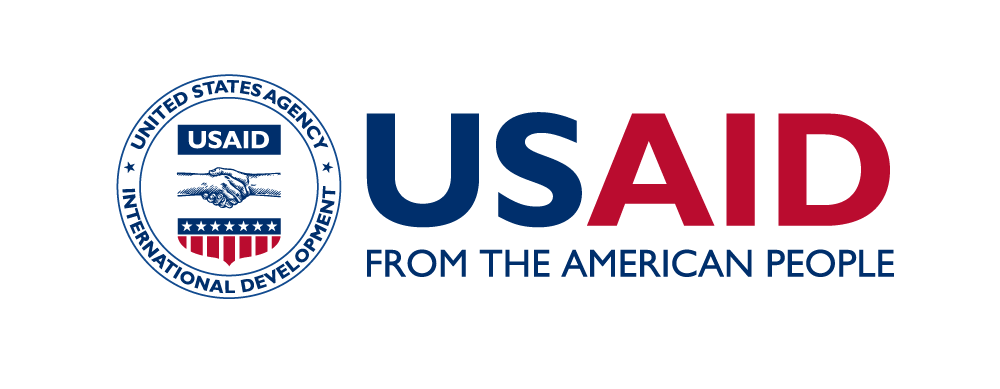
Operationalizing a Wellbeing Economy in Fisheries
Modern fisheries operate under a paradigm of constant growth, marked by rising global production and consumption. Although this growth has led to economic gains and technological advancements, it has threatened the sustainability of marine ecosystems. This has significant consequences for the livelihoods and wellbeing of fishers, consumers, and coastal communities that depend on these resources worldwide. A wellbeing economy offers an alternative paradigm. Based on the five pillars of Purpose, Dignity, Nature, Fairness and Participation, a wellbeing economy seeks to balance economic activities with the health of the environment and social equity. We will use this IIFET Special Session to examine the operationalisation of these pillars through the lens of the fishing sector.
Boosting Blue Economies through South-South Collaboration: Policy Roundtable
Time: 11:00–11:45 am, July 16
Venue: St. Giles Wembley Hotel Ballroom
Moderator
Dr. Nitya Rao Swaminathan, Professor of Gender & Development, University of East Anglia; Commissioner, EAT-Lancet Commission 2.0; Scientific Advisory Committee Member, United Nations Food Systems Coordination Hub
Panelists
- Datuk Arthur Joseph Kurup, Deputy Minister of Agriculture and Food Security, Malaysia
- Opuama Paul Apoy, Deputy Director, Fisheries and Aquaculture Department, Ministry of Marine and Blue Economy, Nigeria
- Davies Mukwabi Makilla, Acting Director of Blue Economy in the State Department for Blue Economy and Fisheries, Kenya
- Dr. Domingos da Conceição dos Santos, State Secretary for Fisheries, Timor-Leste
This session is being hosted under the aegis of Asia–Africa BlueTech Superhighway, funded by the UK Government and implemented by WorldFish with a host of partners to transform aquatic food systems in Africa and Asia
Regenerative Aquaculture: Economics and Policy Panel Discussion
Time: 15:30 to 17:00, July 16,
Venue: Wembley Room #9
Co-organized by the IDRC-led AQUADAPT program and the WorldFish-led CAINA project
Aquaculture, as a fast-growing sector of the global food system, is subject to policy debate, consumer pressure, market demands and regulatory compliance that places the sector in the vanguard of such food system transformations. This session will aim to assess how the sector might respond to this complex policy environment and associated market and regulatory incentives, drawing on the experiences of the AQUADAPT program, supported by the International Development Research Centre (IDRC) that aims to catalyse the transformation of Asia-Pacific aquaculture by supporting nature-positive, regenerative systems.
Session Chair: Prof. Eddie Allison, WorldFish
Panelists:
- Dr. Nikita Gopal, Senior Scientist, Indian Council of Agricultural Research-Central Institute of Fisheries Technology, India, and Chair of the Gender in Aquaculture and Fisheries Section of Asian Fisheries Society
- Dr. Silva Larson, Senior Research Fellow, School of Science and Engineering, University of the Sunshine Coast, Australia
- Justin Hunter, CEO of J. Hunter Pearls, aquaculture business, Fiji
- Dr. Victor Nikijuluw, Senior Ocean Program Advisor, Konservasi Indonesia (NGO), Indonesia
- Prashneel Chandra, Representative, Ministry of Fisheries, Fiji
- Andrew Ng, Director of Business Development at HJT Foods Sdn. Bhd., Malaysia
Funded by IDRC and the Government of Canada

Post-Conference
Excursions
Several excursions are being arranged for delegates wishing to experience more of Penang and Malaysian life on Friday 19 July 2024.
For detailed information on available excursions please download the PDF HERE.
Excursions can be booked through the conference registration system.

'Tides of Flavor' Aquatic Food Tour
Join us for an unforgettable culinary adventure. We will travel to the quaint fishing village Balik Pulau, stopping en route at a local fish restaurant to try the catch of the day. Then we visit a traditional shrimp paste factory, enjoy Penang's famous Assam Laksa, and finish off with a delicious Mee Udang. Explore the charming area of Balik Pulau, known for its farms, plantations, and fishing enterprises. Dive into the authentic flavors and traditions of Penang on this unique gastronomic journey.
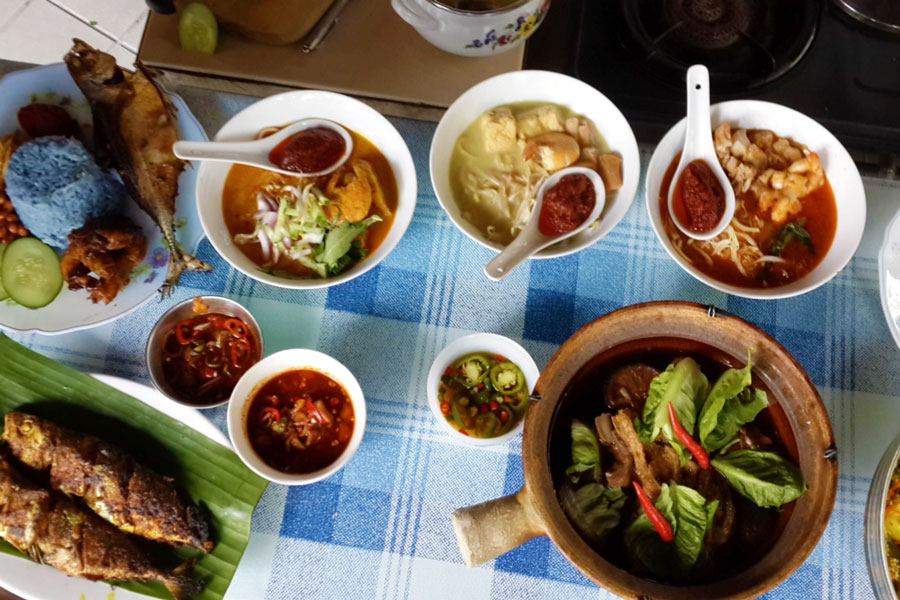
Peranakan Culinary Experience – Cooking course with Pearly
Join Pearly Kee for a Nyonya cooking class, starting with a visit to Pulau Tikus wet market to seek out and sample the fresh ingredients that you will use to prepare three different dishes. Nyonya cooking uses various Chinese ingredients and spices, prepared using Malaysian and Indonesian cooking techniques. The class is held in an outdoor cooking area at Pearly’s home.
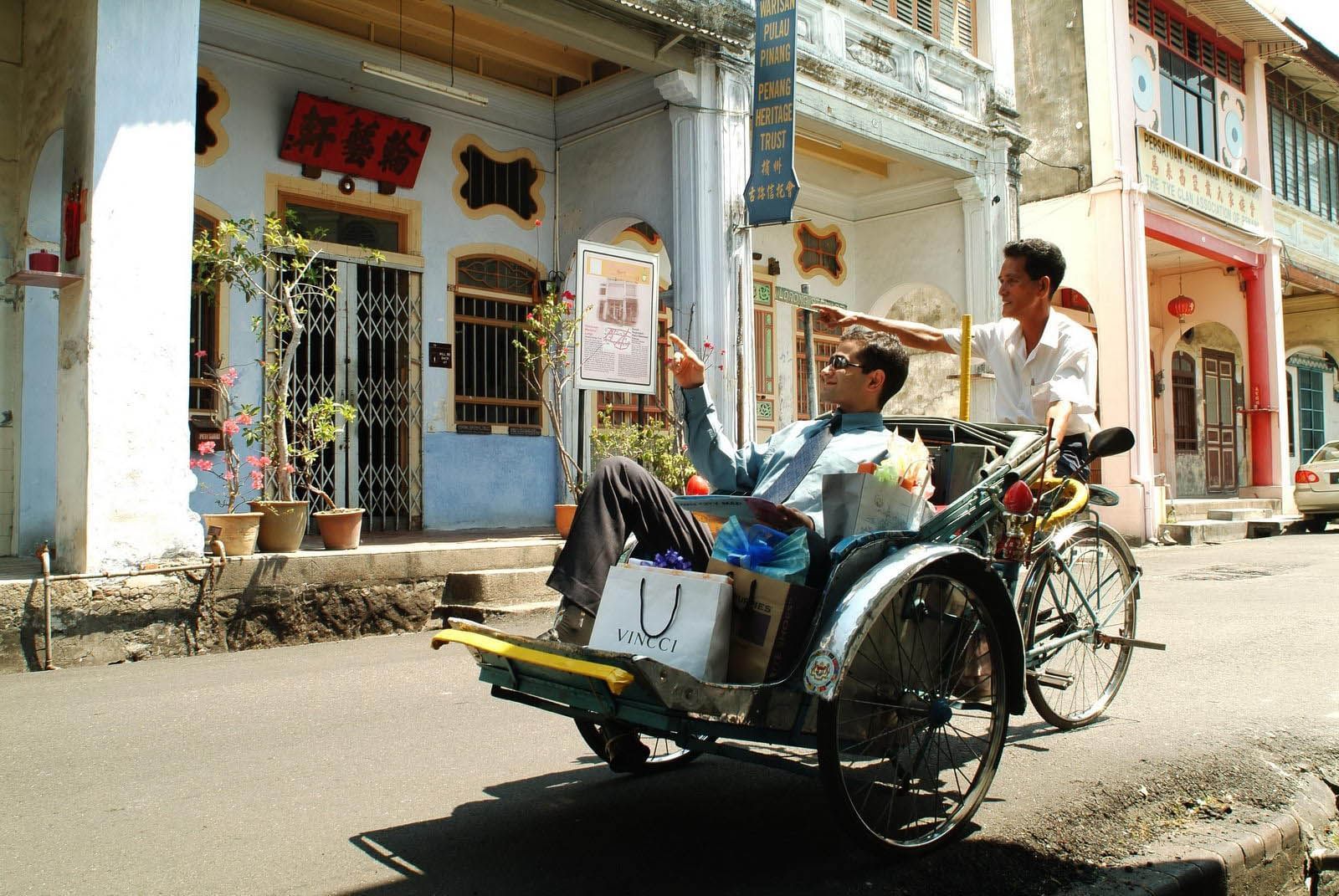
George Town World Heritage Trail
Join an experienced guide for a 2.5 - 3-hour exploration of the beautiful UNESCO World Heritage Site of George Town. It will start from the ‘Street of Harmony’ - so called as it is home to a church, a mosque, a Hindu temple and a Taoist temple, all constructed in the 18th Century. Then it is onto Armenian Street where you will see several forms of street art including the famous Children on a Bicycle mural, Chinese clan houses, museums, and shophouses selling antiques and souvenirs. The trip ends at the Clan Jetties and from there it is easy to travel back using the free CAT shuttle buses that leave from the Jetty Terminal to KOMTAR every 15 minutes. This is just a short walk back to the hotel.

The Habitat Penang Hill
This trip offers an authentic, diverse and educational Malaysian rainforest experience. Meet The Habitat guide at the lower funicular station at Air Itam and take the 8-minute train ride to the upper station. From there is a short walk to the entrance of The Habitat, where you will enjoy a 1.5 hour guided walk. At the Andaman Tent, there will be a presentation and discussion with Habitat Foundation Team, followed by lunch.
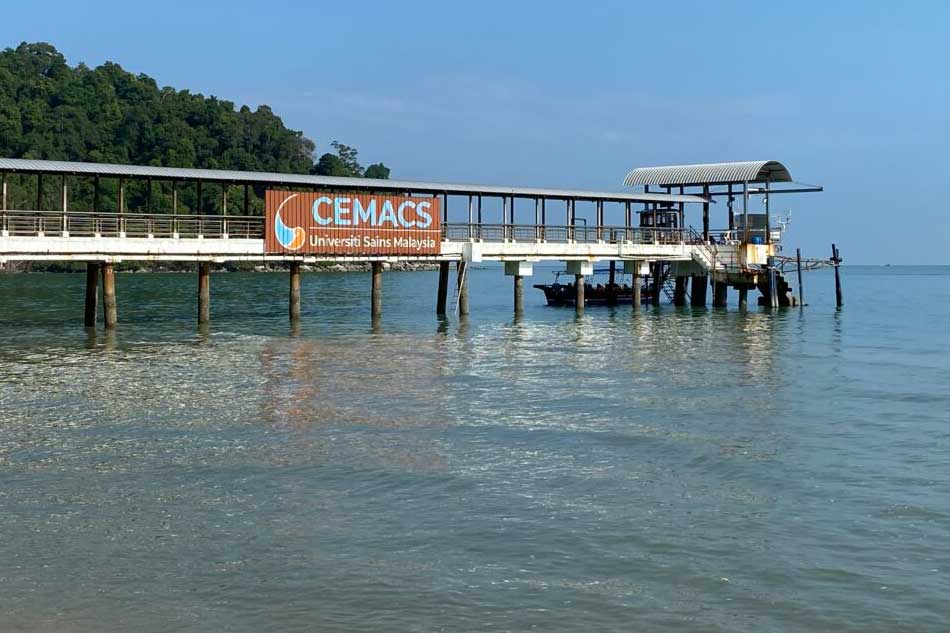
Visit to the Centre for Marine and Coastal Studies (CEMACS)
Travel by bus to the Penang National Park, where you will get the boat to CEMACS. After an introductory talk about the Centre and the research that is undertaken there, you will visit the aquaculture labs, the National Marine Reference Collection and the Climate Change and Biodiversity Gallery. After lunch, you can spend more time at CEMACS or enjoy the beach, (showers are available if you would like to swim), before taking the boat back to the Teluk Bahang entrance of the Penang National Park and then the bus back to the hotel.
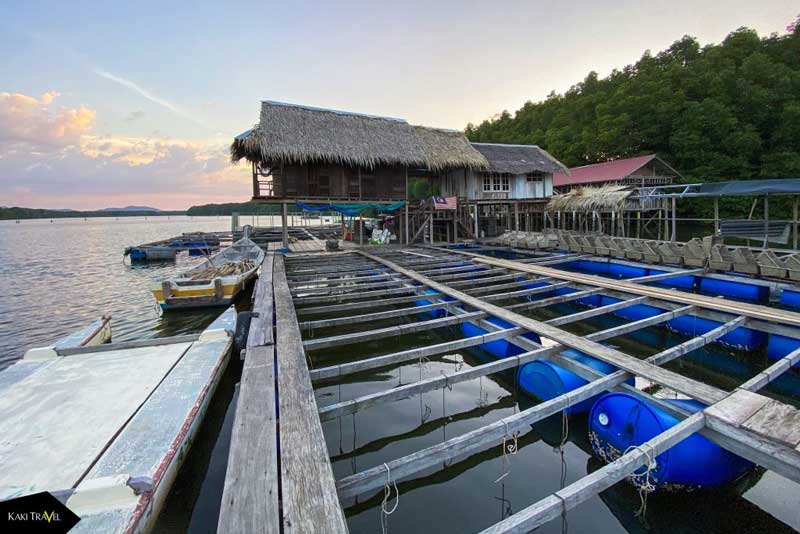
Visit to Sungai Merbok oyster farm and guided mangrove tour
Two Science Officers from Centre for Marine & Coastal Studies (CEMACS) will meet you at the hotel. The bus trip should take about one hour, depending on traffic. You will meet Pak Su who will tell you all about his oyster farming operation. You will then enjoy an exclusive mangrove boat tour and visit the Sungai Merbok oyster farm, followed by lunch at a floating restaurant, before heading back to Penang.
